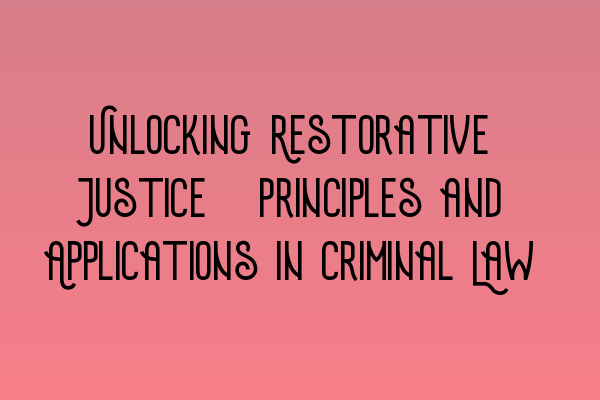Unlocking Restorative Justice: Principles and Applications in Criminal Law
Restorative justice is a concept that has gained significant attention in the field of criminal law. It focuses on restoring the harm caused by criminal behavior, primarily through direct engagement with the victim, the offender, and the community. In this blog post, we will explore the principles and applications of restorative justice in the UK criminal justice system.
Understanding Restorative Justice
Restorative justice, as the name suggests, is an approach that aims to restore harmony and address the needs of all parties involved in a criminal offense. It emphasizes personal accountability, healing, and reconciliation, rather than solely focusing on punishment.
Restorative justice is rooted in principles such as:
- Inclusion: All affected parties, including the victim, the offender, and the community, are actively involved in the process.
- Reparation: The focus is on repairing the harm caused by the offense, both tangible and intangible.
- Empowerment: The process encourages the parties to take responsibility for their actions and actively participate in finding solutions.
- Inclusivity: The process acknowledges the importance of cultural sensitivity and inclusivity to ensure fairness and understanding.
The Applications of Restorative Justice in Criminal Law
Restorative justice has several applications within the criminal justice system. Let’s explore some of them:
1. Victim-Offender Mediation
Victim-offender mediation is a process facilitated by a neutral third party, where the victim and the offender come together to discuss the offense, its impact, and potential ways of repairing the harm caused. It provides an opportunity for the victim to express their feelings and needs and for the offender to take responsibility for their actions.
This type of mediation can be voluntary or court-ordered, depending on the circumstances of the case. It allows the victim to have a voice in the criminal justice process and helps the offender understand the consequences of their actions on a personal level.
Learn more about victim-offender mediation in our article: Workshops and Seminars on Criminal Practice: Expanding Your Expertise.
2. Community Conferencing
Community conferencing brings together the victim, the offender, their respective support people, and community members to discuss the offense and develop an agreement that addresses the harm caused. This approach aims to involve the community in the resolution process and emphasizes collective responsibility and support.
Community conferencing can help rebuild trust, create stronger bonds within the community, and develop alternative resolutions that go beyond traditional punitive measures. It encourages community collaboration and fosters a sense of accountability among all parties involved.
Read more about the benefits of community conferencing in our article: Updates in UK Criminal Laws: Staying Informed and Prepared.
3. Restorative Diversion Programs
Restorative diversion programs offer an alternative to traditional court proceedings for certain offenses. These programs aim to address the underlying causes of criminal behavior, provide support and guidance to the offender, and repair the harm caused by the offense.
Participants in restorative diversion programs may engage in activities such as community service, counseling, or education. The focus is on rehabilitation rather than punishment, with the goal of preventing future criminal behavior and promoting integration into the community.
Discover how restorative diversion programs can enhance the criminal justice system in our article: Enhancing Your SQE Criminal Law Study Group Experience.
Conclusion
Restorative justice offers a unique approach to addressing criminal behavior, focusing on healing, accountability, and community involvement. By prioritizing the voices and needs of all parties involved, it strives to create a more inclusive and effective criminal justice system.
To delve deeper into the various aspects of criminal law, explore our related articles:
- Workshops and Seminars on Criminal Practice: Expanding Your Expertise
- Updates in UK Criminal Laws: Staying Informed and Prepared
- Enhancing Your SQE Criminal Law Study Group Experience
- Decoding Criminal Evidence Rules: A Detailed Analysis
- Deep Dive into Fraud and Financial Crimes in the UK
At SQE Criminal Law & Practice Law UK, we are dedicated to providing expert knowledge and resources to help you excel in your understanding of criminal law. Contact us today to learn more about our workshops, seminars, and study group experiences.
